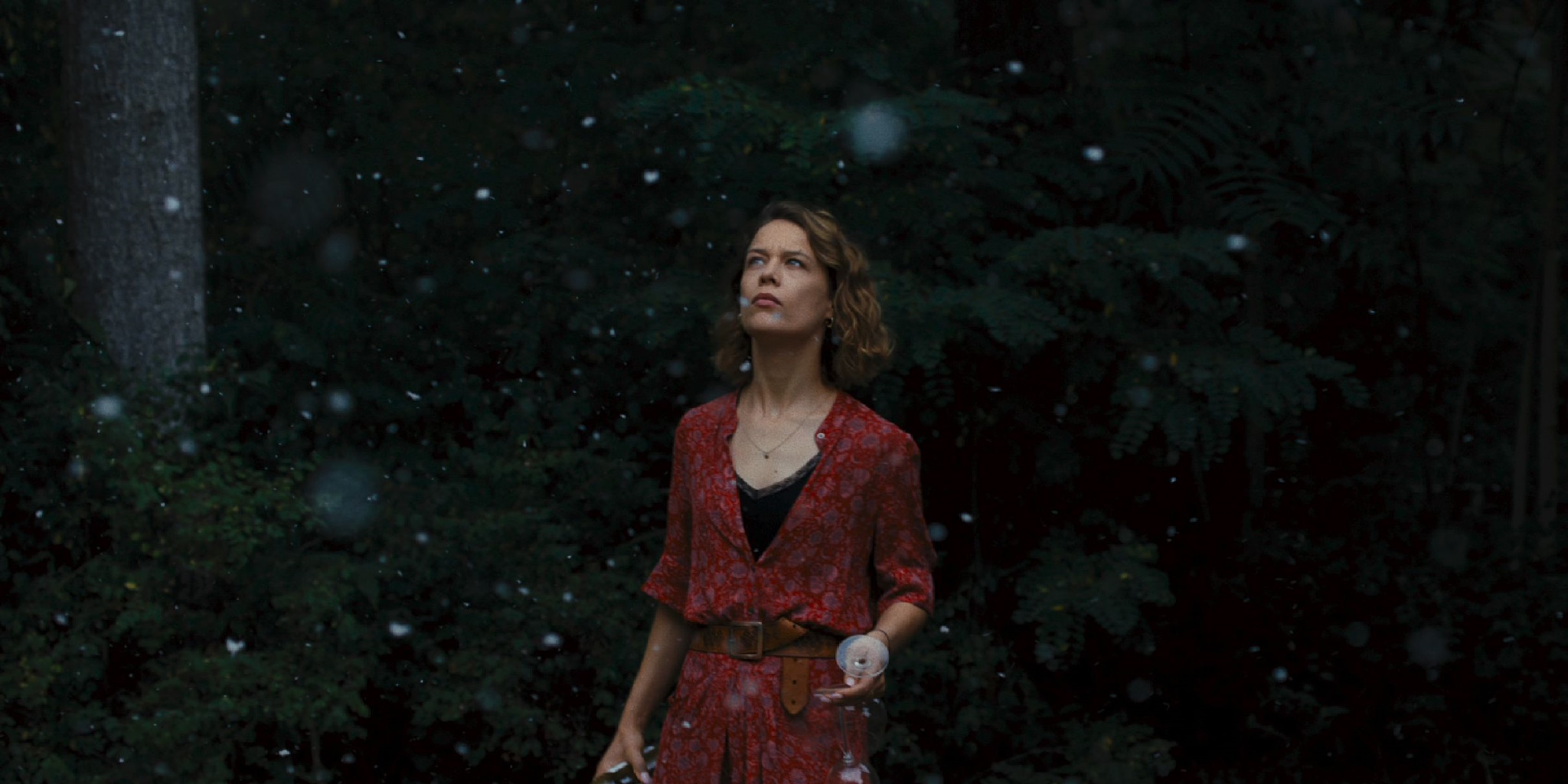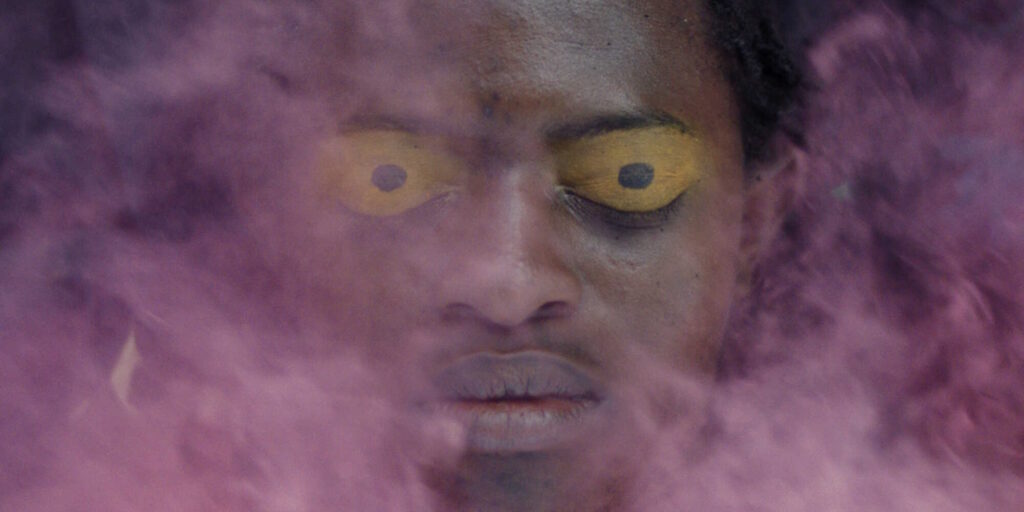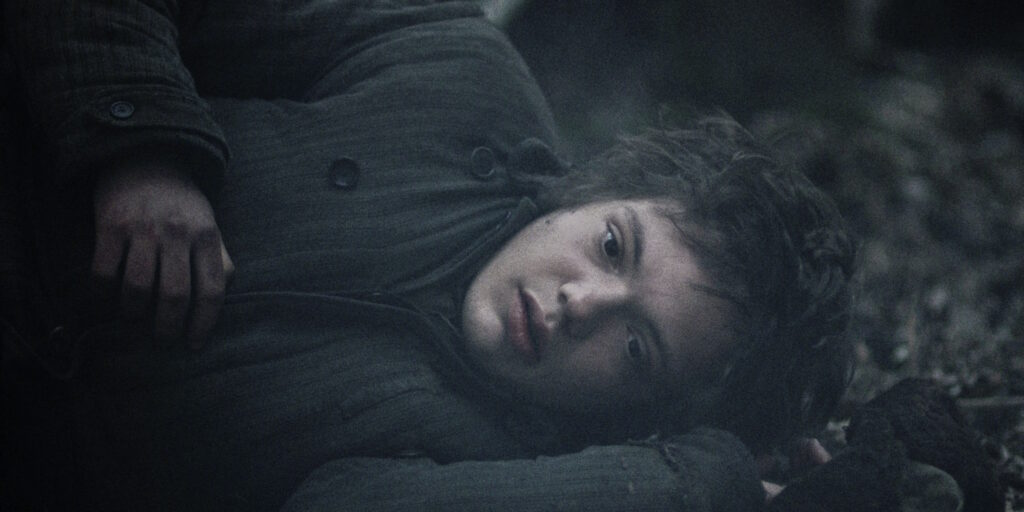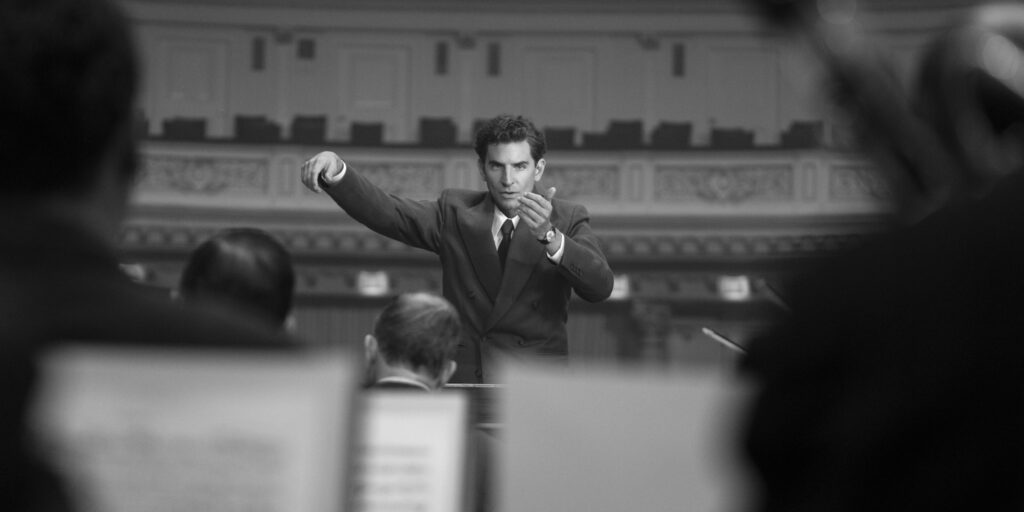Note: This review was written during the 2023 WGA and SAG-AFTRA strikes. Without the labor of the writers and actors currently on strike, the film being covered here wouldn’t exist.
Afire, the latest feature from writer-director Christian Petzold (Phoenix, Transit), presents a slow-boil character study of that pop-cultural bugaboo, the unlikeable protagonist. Leon (Thomas Schubert) is an awkward, uptight introvert, the sort of person who would seem pitiable if he weren’t such a supercilious dick. A writer with one published novel to his name, he possesses that distinctive intellectual gestalt of dour arrogance and crippling insecurity. We all know the type: Every statement is a self-absorbed complaint, every question a passive-aggressive swipe. He greets the world with an eye roll and an exaggerated sigh, assuming a disposition of perpetual, put-upon misery as a kind of security blanket. Leon is, as they say, the Worst.
As the film opens, he and his best friend Felix (Langston Uibel) are heading to a bungalow nestled in the woods along Germany’s Baltic coast. Felix’s mother owns the cottage, and the purpose of this late-summer getaway is ostensibly to allow him to complete his photographic portfolio and Leon to finalize the draft of his second novel. Their creative retreat has a rough start when Felix’s car breaks down a few kilometers from the cottage, forcing them to hike the remaining distance through a forest threatened by wildfires. Most of the vacationers have fled from the region’s coastal resorts, but Felix assures Leon that the danger is minimal. Once they arrive at their destination, a more intimate disruption is revealed: Felix’s mother has already rented the cottage to a seasonal worker named Nadja (Paula Beer), obliging the trio to share the same space for a few days.
Initially, Nadja is something of a phantom presence, a never-seen housemate revealed by a telltale trail of half-empty wine glasses and rumpled clothing. The affable and easygoing Felix is unperturbed, but Leon instantly dislikes this interloper. Apart from his disapproval at her untidy habits, he’s kept awake at night by her enthusiastic hookups with local lifeguard Devid (Enno Trebs). Leon huffily regards this woman as an intolerable intrusion that has ruined his working vacation before it even began. When he finally catches a glimpse of Nadja – buoyant and beautiful in a red sundress, whistling brightly as she hangs laundry – Leon’s petulance evolves into something more complicated and exasperating. He’s obviously smitten, but he seems to resent the attraction, and so he doubles down on his attitude of sulky standoffishness.
Petzold allows this situation to unfold with the pleasant languor of a breezy August afternoon, while also maintaining a whiff of smoldering unease. Leon’s sour haplessness is played for light cringe comedy, but there’s a horror-movie quality to watching him self-sabotage at every turn. Nadja makes repeated friendly overtures to him, and when he’s not whiffing the opportunity, he’s actively pushing her away with his surly posturing. (Pro tip: When Paula Beer asks you to ditch your housemates and join her for a moonlit walk on the beach, you say YES.) He also takes out his frustration on the other men, belittling Felix’s proposed photography project and peppering Devid with patronizing queries about his job. One senses that Leon is always something of a wet blanket, but Nadja’s destabilizing presence has escalated his peevishness to new, excruciating levels.
The magic trick to Afire is that Petzold permits the viewer to glimpse a little humanity through the haze of Leon’s relentless awfulness, just enough to sustain our empathy as he blunders about. In a film that is otherwise short on backstory, Katharina Ost’s wonderfully understated costuming plays a vital role in establishing character. Whereas the rest of the cast tends to wear light, late-summer attire – Felix and Devin frequently go about shirtless – Leon dresses like an IT manager on a blind date, keeping his pudgy frame perpetually wrapped in long sleeves and dark colors. The telltale edge of a tattoo sometimes peeks out from his shirt collar, suggesting the deeper psychological scars that Leon is not prepared to expose to the sunlight.
Shubert’s marvelous performance snakes between the lines of Petzold’s screenplay, conveying a man whose misanthropy appears to mask a deep, almost violent self-loathing – about his appearance, his awkwardness, and most of all his lack of literary talent. He is at once manically preoccupied with his new novel and utterly apathetic about putting in the work to prove that his debut was not just a fluke. He convinces his editor, Helmut (Matthias Brandt), to drive up and join him at the cottage for a working session but then bristles at the man’s well-meaning criticisms. As Helmut reads the latest draft aloud with a palpable lack of enthusiasm, Leon acquires the dead-eyed look of a prisoner being led to the gallows: Oh, God, am I a bad writer? The fact that Helmut exhibits more interest in Felix’s portfolio and Nadja’s literary ambitions than in Leon’s novel is just salt in the wound.
Afire might provoke winces of secondhand embarrassment, but it doesn’t demand that the viewer sympathize with Leon’s egocentric outlook and asinine behavior. Indeed, its portrayal of omega-male toxicity, at once self-pitying and self-regarding, is quite ruthless. Petzold refuses to allow Leon even one win, illustrating how all of his poor choices and faux pas compound one another. It’s not incidental that Nadja both embodies and subverts the manic-pixie-dream-girl trope. She maintains a sunny, approachable demeanor despite Leon’s constant, off-putting negativity, but it’s clear that her desires, interests, and ambitions extend beyond the boundaries of his summer-holiday infatuation. When she eventually reveals hidden depths that he can barely fathom, he blusters his indignation, as if she had kept a secret from him. “You didn’t ask,” is her curt reply.
Underneath the film’s seriocomic relationship melodrama simmers a darkly anxious mood. The film’s setting might be bucolic, but the threat of the wildfires – discernible only as an eerie orange glow on the nocturnal horizon – bestows Afire with a tinge of apocalyptic dread. The coastal forest buzzes night and day with passing helicopters and echoes with the distant squeal of wild boars fleeing the flames. Some upheaval is approaching, although from which direction is ominously indefinite. Is Leon moving toward an epiphany of self-awareness, or bumbling further into frustration and resentment? One thinks, worryingly, of The Idiot’s Rogozhin, whose obsession with the object of his desire was mingled disturbingly with violent compulsions. Such twisted emotional logic isn’t entirely outside Petzold’s wheelhouse; his films Jerichow (2008), Phoenix (2014), and Transit (2018) are all perverse romantic noirs in their way. However, Afire is operating in a warmer, more open-hearted register. The potential for tragedy is never off the table, but here the filmmaker’s facility for constructing sadistic dramatic death traps takes a back seat to his humanistic fascination with the messy narcissism of an inveterate loser.
Afire screens nightly at 7:30 p.m. from Aug. 4 – 17 at the Wesbter University Film Series.




